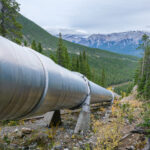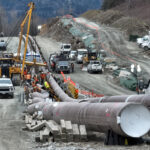From Reuters
SAINT PAUL, Minn. (Reuters) – A Minnesota regulator on Thursday approved a certificate of need for Enbridge Inc to rebuild its Line 3 oil pipeline, angering environmentalists but offering hope to Western Canadian oil producers that have struggled to move crude oil to refiners.
The Minnesota Public Utilities Commission’s decision clears the final major hurdle, pending possible appeals, in Enbridge’s three-year effort to rebuild its aging, corroded 1,031-mile (1,660-km) pipeline that runs from Alberta in western Canada to Wisconsin.
Shares of Calgary, Alberta-based Enbridge closed up 3.7 percent in Toronto.
The commission also approved a route that closely follows Enbridge’s preference and will take Line 3 over a new corridor for part of its path.
The certificate of need has conditions, including that Enbridge make a financial guarantee to clean up any environmental damage and that it remove at landowners’ request pipeline that is no longer in use.
Pipeline bottlenecks have steepened a price discount for Western Canadian heavy crude this year. Refiners in Minnesota and surrounding states say Line 3 is necessary to increase crude supplies.
Shouts from Native Americans and environmental activists interrupted the meeting. “Shame on you, you cowards!” one woman shouted before breaking into tears.
Environmental groups and some indigenous communities oppose the project over concerns about spills and impact on tribal wild rice harvesting areas.
“What they have done to us today is egregious,” said Winona LaDuke, executive director of Honor the Earth activist group. “They have gotten their Standing Rock. We will do everything that is needed to stop this pipeline.”
The Standing Rock tribe led opposition in 2016 to the Dakota Access Pipeline in North Dakota, one of the most bitterly contested energy projects in years. It was eventually built.
The coalition of Line 3 opponents is likely to formally request that the commission reconsider its approval, said Joe Plumer, lawyer for White Earth Nation.
Business and labor groups say the $7 billion project, of which $2.5 billion would be spent in Minnesota, will create jobs and tax revenue.
“It’s going to give everybody a real boost,” said Bob Schoneberger, who runs a piping contractor business in Duluth, Minnesota.
Enbridge Chief Executive Al Monaco said in a statement that he was pleased with the commission’s decisions, and said the project’s cost was materially unchanged. He said he continues to expect the rebuilt pipeline to begin service in the second half of 2019.
Line 3, which began service in 1968, operates at half its capacity. Its replacement would allow it to return to approved capacity of 760,000 barrels per day.
“That pipeline is an accident waiting to happen,” said Commissioner Dan Lipschultz. “It feels like a gun to our head that compels us to approve a new line … but the gun is real and it’s loaded.”
Several commissioners voiced doubts that demand for crude oil and refined products such as gasoline would grow enough to warrant the pipeline. But Enbridge’s rationing of demand from oil shippers for space on Line 3 was more convincing of a need to rebuild, said Chairwoman Nancy Lange.
The rebuilt Line 3 will follow the existing pipeline path partway through Minnesota, before veering south to bypass Leech Lake reserve and avoid a need to shut down the pipeline for up to one year during construction.
The path of a short stretch near Fond du Lac reserve will be determined by negotiations between the tribe and Enbridge.
Tribes in the area had said Enbridge’s preferred route was the worst of numerous options. Fond du Lac lawyer Seth Bichler told the commission that the tribes preferred a longer route to the south that would avoid more sensitive land.
Recognized parties, including Enbridge, environmental and indigenous groups, have 20 days from the time a written order is issued – likely in a couple of weeks – to ask the commission to reconsider. If such an application is denied, a party can then appeal to Minnesota’s appeals court.
Line 3 also requires 29 additional permits from local, state and federal levels, Minnesota Governor Mark Dayton said in a statement.
“Approvals are by no means assured,” he said.







